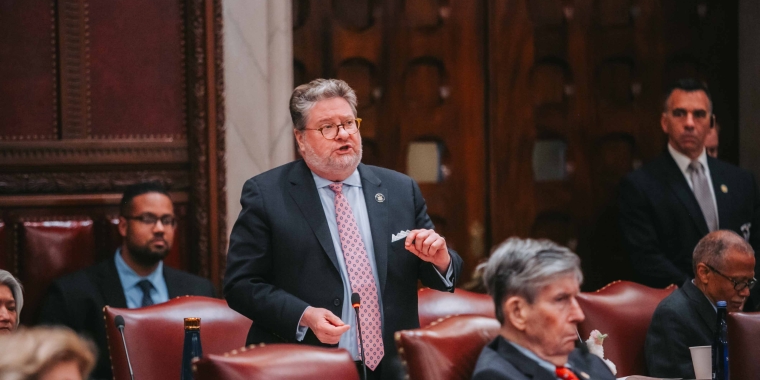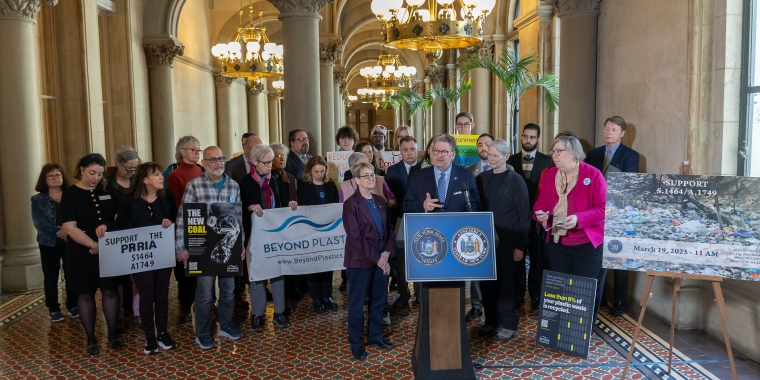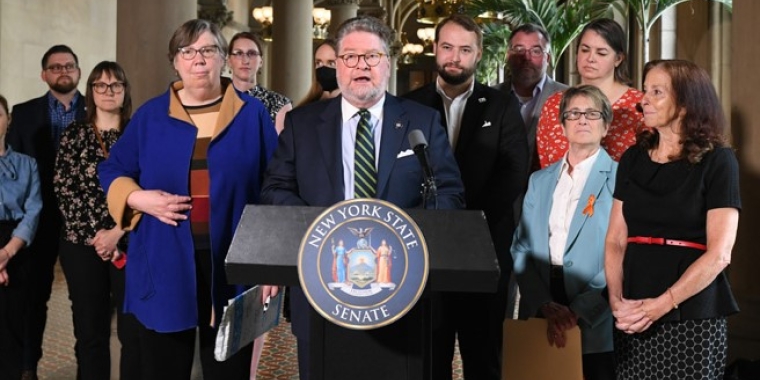
Harckham: Some Silver Linings in State’s 2020-2021 Budget
April 2, 2020
-
ISSUE:
- 2020-2021 New York State budget
- Coronavirus Pandemic; Health Care; Small Businesses; Financial Relief; Public Health

Albany, NY – New York State Senator Pete Harckham, following his votes on the recently passed and signed 2020-2021 State Budget, delivered this assessment for constituents in the 40th Senate District: there is little to cheer about in terms of funding increases, but there are some silver linings.
“During the particularly difficult budget deliberations that took place under the shadow of the coronavirus pandemic, where we saw our economy close overnight and livelihoods disappear, we knew that our priority needed to be the safeguarding and care of state residents,” said Harckham. “This required a major shifting of resources, due to the disappearance of billions of dollars in tax revenue, and a determination to make the best of these circumstances. As a result, many spending initiatives and investments were either scaled back or put off for now. Along with my colleagues in the Senate Majority, though, I continued to fight for education aid, healthcare spending and maintaining essential services in order to support the struggling taxpayers, small business owners and local municipalities who are facing incredible challenges right now.”
Education: A major accomplishment in the 2020-2021 State Budget was the restoration of nearly all proposed cuts in education and a holding the line on funding for New York State schools and education programs, despite the momentous economic downturn and lower anticipated revenue. This meant:
• Providing a $104 million increase in School Aid for a total of $27.9 billion;
• Ensuring every school district is held harmless in Foundation Aid and will receive the same amount as in 2019-20—a total state-wide investment of $18.4 billion;
• Providing a $96 million increase for expense-based aids for a total funding level of $8.99 billion;
• Providing $10 million in new funding for student mental health support grants and $1 million for civics curriculum development;
• Additionally, past years’ competitive grants are maintained, totaling more than $230 million in funding to school districts for programs such as early college high schools, after-school programming, and advanced courses.
Total funding for school districts in the 40th Senate District amounted to more $391 million in the new budget, a decrease of only $2.2 million overall from the previous year, remarkably enough.
Veterans: Harckham is fully committed to protecting and providing services to over 800,000 veterans in New York State. The 2020-21 budget includes:
• Providing funds for programs that help connect veterans with peers, address PTSD and transition back to civilian life;
• Extending the ‘Hire-a-Vet’ tax credit to help incentivize New York businesses to provide good paying jobs for returning veterans;
• A return to last year’s funding for the Joseph P. Dwyer Veteran Peer to Peer Services, a $2,017,500 increase from the initial budget proposal.
Harckham managed to ensure $370,000 in the budget for the Dwyer Peer to Peer program in Westchester and Putnam counties.
Public Safety: Harckham, along with Senator Shelley Mayer and Majority Leader Andrea Stewart-Cousins, managed to maintain $2.2 million of support for the Westchester County Public Safety’s policing program, same as last year’s level, while also providing $1.25 million for the 2-1-1 Helpline operated by United Way of Westchester and Putnam.
Health and Health Care Services: As New York battles the coronavirus pandemic, the need to protect health care spending and invest in quality medical services for New Yorkers has never been more essential. The new budget, Harckham noted, includes:
• Expanding access to telehealth in the Medicaid program so more New Yorkers can connect with their physical and mental health providers;
• Prohibiting the retail sale of flavored vapor products, unless the product is FDA approved; regulating dangerous carrier oils that cause vaping illnesses; and creating a new education campaign regarding the dangers of vaping for school aged youth;
• Designating 13 fentanyl analogs to Schedule I controlled substances to get these drugs off the streets and protect New Yorkers;
• Authorizing the Department of Financial Services to investigate prescription drug price increases of over 50% and indications of fraud, and creating the Drug Accountability Board to participate in the investigations;
• Limiting out-of-pocket expenses for a 30-day supply of insulin to be capped at $100;
• Establishing the Curing Alzheimer’s Health Consortium within SUNY to identify genes that predict an increased risk for developing Alzheimer’s.
As chair of the Senate Committee on Alcoholism and Substance Abuse, Harckham has been a staunch advocate for expanding use of Medication-Assisted Treatment (MAT) for Substance Use Disorder treatment by eliminating prior authorization for patients with Medicaid.
The new budget, through the Medicaid Redesign Team II recommendations, creates a single State formulary for Medication Assisted Treatment prescription drugs for opioid use disorder by expanding the provision to also include gene therapies and other “high cost” drugs. These classes of drugs would not be subject to prior authorization if they were placed on the single state formulary. “This provision, in itself, will save many lives,” said Harckham. In January 2020, Governor Cuomo signed a new law, which was introduced by Harckham, that prohibits insurance companies from requiring prior authorization for medications used in the treatment of substance use disorders.
Environmental Protection and Conservation: New York State’s environment and natural resources received strong investment in the 2020-2021 budget, and includes:
• Authorizing the $3 billion ‘Restore Mother Nature Bond Act’ which includes:
o $1 billion for restoration and flood risk reduction;
o $700 million for climate change mitigation;
o $550 million for open space land conservation and recreation;
o $550 million for water quality improvement and resilient infrastructure; and
o Specific provisions for projects benefiting environmental justice communities.
• Reauthorizing the Environmental Protection Fund at $300 million;
• Banning polystyrene food packaging and polystyrene packaging peanuts beginning January 1, 2022;
• Banning high-volume hydraulic fracturing, plus imposing a moratorium on applications for gelled propane hydraulic fracturing filed with the Department of Environmental Conservation;
• Creating a new Office of Renewable Energy Siting, a NYSERDA build-ready program, and an electric power transmission plan to accelerate the development of renewable energy, while ensuring community input and benefits and environmental protections.
The new budget also bans high-volume hydraulic fracturing, and imposes a moratorium on applications for gelled propane hydraulic fracturing filed with the Department of Environmental Conservation—“the strongest stance against fracking in the entire country,” said Harckham.
Bail Reform and Law Enforcement: As part of the state’s ongoing efforts to fix the criminal justice system and keep New York communities safe, key provisions were advanced in the budget to modify last year’s Bail Reform Law. These include:
• Making several high-level offenses now bail eligible, including certain sex crimes, high level drug offenses, domestic violence felonies, crimes resulting in a death, and offenses directly related to an individual's flight risk.
• Creating a mechanism to address individuals who repeatedly commit crimes;
• Expanding the reporting requirements so that the Department of Criminal Justice Services and the Office of Court Administration can better track outcomes of the state's new bail law; and
• Maintaining the existing bail structure where most misdemeanors and non-violent felonies are not bail eligible.
The new budget also provides $40 million to support the implementation of discovery reforms, which will help prosecutors disclose evidence with defense earlier in court proceedings.
“While this isn’t the state budget we hoped for three weeks ago, the enacted budget provides security and stability to all New Yorkers and their families as we continue to face the COVID-19 pandemic and economic crisis,” said Harckham. “This is a responsible budget that protects New Yorkers’ health and values during these difficult times. I will keep working with my colleagues to advance important legislation over the coming months to address this pandemic and continue providing the essential government services New Yorkers rely on.”



